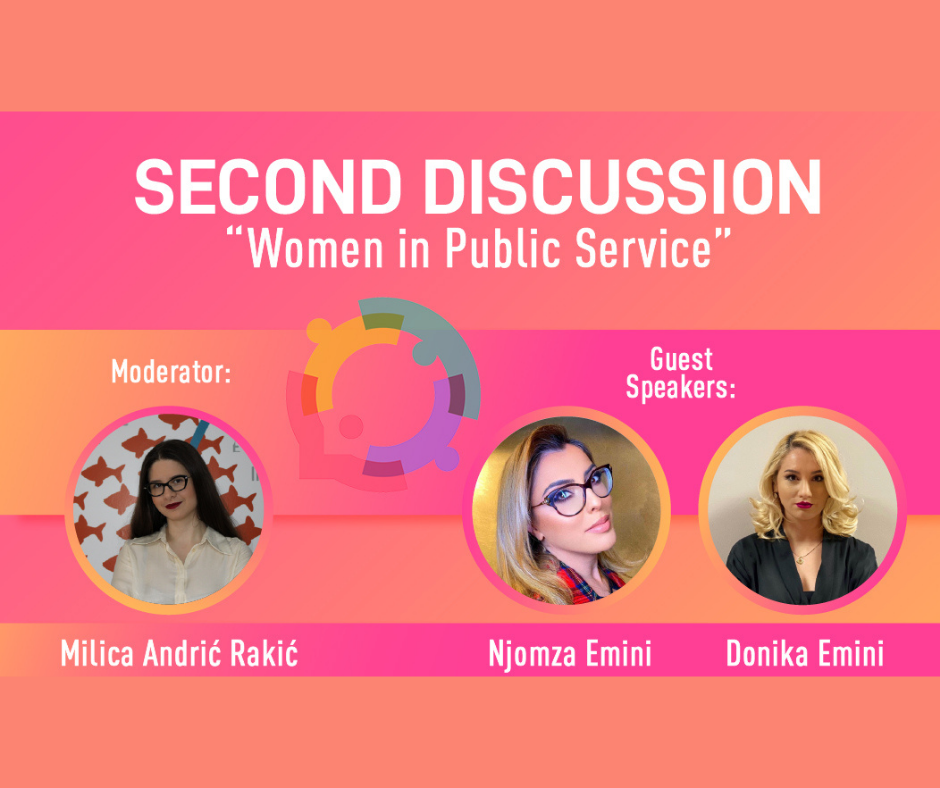Category: Blog Organizations: Forum for Leadership and Diplomacy , Platforma CiviKos Tags:
Njomza Emini is the executive director of the Forum for Leadership and Diplomacy and the president of the Kosovo Paralympic Committee. She was a member of the Assembly of Kosovo for two terms, and she also worked as a consultant in international organizations such as the OSCE Mission in Kosovo. In addition to all that, Njomza was also awarded the Legion of Honor in the rank of knight, a title that France awards to individuals for cooperation with their country.
Donika Emini is a PhD student at the University of Westminster and the Executive Director of the CIVIKOS platform, which brings together more than 250 civil society organizations in Kosovo.
Njomza and Donika Emini share the same mission and last name, but they are not related, although people often think so. Both of their work sought to contribute to solving social problems in Kosovo and improving public services for all. Gender equality and the improvement of the position of women in Kosovo are issues that they face every day in their work.
When it comes to women in leadership positions in institutions, the fact that Kosovo recently got a second president would seem to some to be a sufficient indicator of the fulfillment of gender equality in institutions
"Based on statistics, having a woman at the top of the state is a great success. Even in the European Union, the percentage of women in the presidency position is quite low," explains Donika Emini.
However, she adds that at the time when Atifete Jahjaga was the president of Kosovo, a small number of women were in leading positions in institutions. The explanation they received when they pointed out the issue of gender equality in public services was that they got a woman president and that should be enough for them, she said.
The new president of Kosovo, Vjosa Osmani, won a large number of votes in the last elections. Donika Emini emphasizes that the expectations from women in institutions are very high and that she hopes that she will use her positions to do more to improve the position of women in society.
Njomza Emini has chosen a path that is unusual for many. It was from public institutions, that is, from the parliamentary bench, that she moved to the civil sector. In her work, she tries to improve the position of women and girls in Kosovo, and she believes that mutual support is one of the ways.
"Women and girls should stand next to each other, and when they see us hanging out and supporting each other, even when we are from different communities, that is a great example for them," Njomza pointed out.
Although the challenges remain, she believes that the situation today for women in institutions is better than when she was a member of the Kosovo Assembly.
Pandemic and the position of women
The COVID-19 pandemic, on the other hand, has only exacerbated pre-existing problems, not only of minority but also of majority groups in Kosovo, especially for many women in Kosovo.
"As a result of the pandemic, all problems have surfaced. Single mothers were not the ones who were considered a priority at all and received the least possible help. Kindergartens were closed and mothers had to survive this one-year period, which was not easy," Donika Emini pointed out.
In addition, women working in the informal market were particularly at risk - their jobs were at risk, and no one dealt with them to address the challenges they faced in this period, said Donika Emini.
"There are also people with disabilities, who were used as a category only for political consumption. Nobody dealt with them, neither the private nor the public sector," she emphasized.
Although there were various projects that supported their employment in the private sector, the story of a small number of them was successful. During the pandemic, this group was not prioritized either, even when it comes to vaccination.
The importance of the civil sector
Njomza Emini strives to help women in the challenges they face with her work. She is most happy when she receives calls in which they tell her about the successes they have achieved.
She points out that through her projects, she managed to include 55 women, not only from the majority, but also from the minority communities in Kosovo, who have acquired new abilities and skills.
"When I see them today in other institutions, as they invite me to tell me that their interviews were successful, I am very happy," he added.
Donika Emini, as the president of the largest platform that brings together civil society organizations - CIVIKOS, points out that Kosovo is a place where civil society can and has room to influence. However, two things are needed for tango, cooperation of civil society organizations with each other and with institutions is a necessary precondition for achieving results.
"CIVIKOS has had a lot of success in its work, but also challenges, which stem from the fact that no government in Kosovo has had a stable continuity. In 2019 and 2020, three governments changed and with each change of government were caused problems that couldn’t ensure continuity and cooperation with them. There were governments that may not have wanted to cooperate with us, they had prejudices or different levels of cooperation with civil society," Donika Emini explained.
"Every government that comes should know and respect the role of civil society in policy-making," she said.




